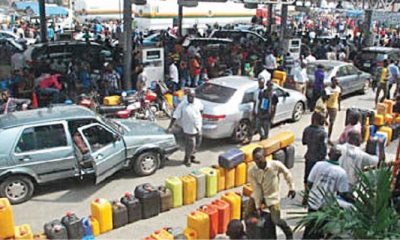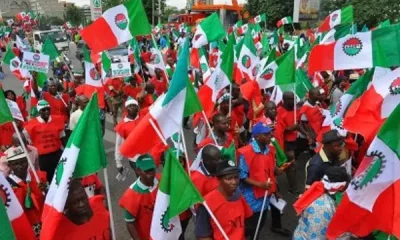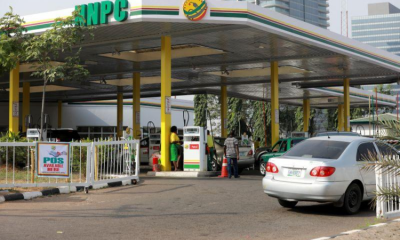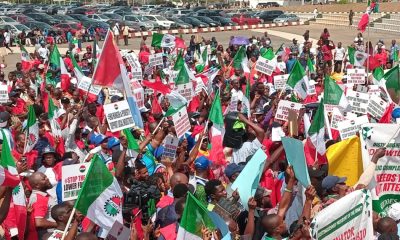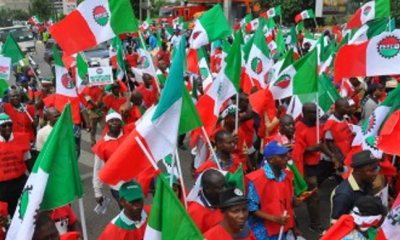Stakeholders in the private sector and economic analysts have said that the Federal Government must design far-reaching palliative measures that would capture not just civil servants, but Nigerians from all walks of life, in its attempt to cushion the effect of fuel subsidy removal.
They stressed that this was imperative because public sector workers constitute an infinitesimal percentage of the country’s estimated 200 million population.
In the aftermath of his inauguration day speech affirming an end to the fuel subsidy regime, President Bola Tinubu had stressed the need for a review of the minimum wage, among other palliatives to be introduced, to cushion the harsh effects of the removal on the citizenry.
He consequently mandated the National Economic Council (NEC) to come up with inputs on palliatives and minimum wage review.
Rising from its meeting at the State House in Abuja on Thursday, however, the NEC proposed palliatives for workers and vulnerable groups in the country. Disclosing the outcome of the NEC, which was presided over by Vice President Kashim Shettima, Bauchi State Governor, Senator Bala Mohammed, said that the Council considered recommendations from the National Salaries Income and Wages Commission to pay N702 billion as cost of living allowance to civil servants as part of the intervention plans .
He also announced the setting up of a committee by NEC to work out, within two weeks, the modalities for organising and distributing the palliative.
Mohammed, who was joined by four other governors Dapo Abiodun (Ogun), Dikko Radda (Katsina), Alex Otti (Abia), and Yahaya Bello (Kogi), also stated that the interventions include a recommended sum, ranging from N23.5bn to N45bn per month, as petroleum allowance for civil servants.
He further explained that the Council also discussed the possibility of obtaining funds from the World Bank and London partners to implement the programme of Compressed Natural Gas (CNG) for vehicles in the country as part of measures to bring down the price of fuel.
“Various scenarios were given by the presenter on the issue of national salaries, income, and wages and this N702 billion plus, was suggested as an allowance for the cost of living adjustment allowance by organised labour and the other one is a petroleum allowance.
“The governor of Ogun has told you that there are other allowances here and there, but with regard to Labour, these are some of the few allowances that they have suggested; that of petroleum will range from N23.5 billion to N45 billion per month, depending on what is in the kitty for distribution or sharing. So, the N702 billion is a suggested sum for labour to cushion the effect on workers on a new allowance that will be tagged cost of living adjustment allowance,” Mohammed said.
But Nigerians, especially leaders of thought from the organised private sector, are demanding that the planned palliatives should be encompassed in such a way that it would reduce inflationary pressures and improve economic conditions of the generality of Nigerians and businesses.
While affirming that government needed a policy action to tackle the cost of living, they noted that the focus of the interventions should be the one that would affect the standard of living of citizens, adding: “While short-term solutions like the provision of buses and increased allowances and salaries are appealing, the committee should also focus on medium and long-term solutions that would progressively enhance the standard of living of all Nigerians.”
They argued that measures should not be designed for only organised labour, which makes up only five per cent or one million personnel of the public sector out of the nation’s 200 million population, alone as the focus.
Already, the Trade Union Congress (TUC) said that with the fuel subsidy removal, the current N30,000 minimum wage has been eroded by inflationary measures, stating that it expected the Federal Government to provide feedback on its demand for N200, 000 minimum wage by tomorrow, Monday, June 19.
The Secretary General of the TUC, Nuhu Toro, told The Guardian that the new minimum wage of N200,000 was part of the demands it gave to the government in respect of the removal of the subsidy.
The Chief Executive Officer, Centre for the Promotion of Private Enterprise (CPPE), Dr. Muda Yusuf, noted that though there is an urgent need for policy action to address the cost of living generally, wage increases don’t cover everyone, as those on payrolls were 10 per cent of the total working population.
He advised the government to focus more on macroeconomic issues, stressing that the Tinubu-led government needed to take action to bring down the cost of food by involving stakeholders in the food processing sector .
“If government engages effectively, ideas will emerge on what it can do to bring down the cost of staple foods. It is necessary also to bring down the cost of food through import duty waivers, and tax waivers on critical inputs, both in food production, processing, and agriculture. That should not take much time on tariff for tax policies,” he said.
On transportation, he said all tiers of government must reel out mass transit buses to convey people at subsidised rates. “Import duty on passenger buses must be reduced or waived to see more supplies of the buses so that we don’t also put those in the vehicle assembly industry at a disadvantage. Their key raw material is SKD; government should waive the import duty, charges, and VAT that are used in the assembly of buses so that vehicle assembling plants, involved in the assembling of buses, can assemble buses at much cheaper rates. If we increase the supply side of transportation, transportation costs will come down, that is the logic.
“On fuel, we need to break the monopoly of NNPC on fuel importation, in the short run, to ensure more players are involved in the importation of petroleum products so that there can be competition.
“On power supply, if we have enough power, the demand for petroleum or diesel will reduce. There is a need for decentralisation of the grid. This will involve some tariff policies and tax measures. We need to do a lot on renewable energy. All taxes, import duties, and VAT on equipment used for renewables should be removed so that not everyone will be hooking up to public electricity because they are so expensive.
“Within a week, the government can change a lot of things; within a week, the government can change taxes, but not wages. Private-sector employers should encourage remote working to avoid pressure on their employees. They should also be prevailed upon to buy staff buses, not only government,” Yusuf said .
A Professor of Economics at the Lagos Business School (LBS), Bongo Adi, on his part, said it is not a wage increase that is needed at this time, but the introduction of monetary policy to fight inflation.
According to him, if the government expands the means of transportation and also expands the movement of goods and commodities around the country, it will improve the living condition of Nigerians, reduce the cost of living, and improve the purchasing power of people’s incomes.
“If you increase wages by 200 per cent and inflation rises by 200 per cent, it doesn’t help, you are still where you were. What will happen when wages are increased now is a proportionate inflationary vault. That is what nobody wants. What can improve quality of life and purchasing power right now is for inflation to drop. We may have N30,000 as a minimum wage, but let’s have inflation drop by 50 per cent. It means that the N30,000 minimum wage can now afford us twice more purchasing power as before.
“With an addition of 500 buses, let them charge the pre-subsidy removal transportation fare, and people will begin to use them. The little money made would be used to service those vehicles. Each state should replicate the same and charge prices for pre-subsidy removal. That will help people more than increasing their wages.
“There is a need for the government to also partner with the private sector to introduce trucks that will help to ferry commodities from different states, from rural areas to the cities; that will also reduce the cost of food,” he said.
Another Professor of Economics and Dean, of the College of Postgraduate Studies, Caleb University, Segun Ajibola, also noted that the country boasts about one million personnel in the public sector out of 200 million population.
He, therefore, stressed that the NEC committee must not just zero in on the about one million Nigerians that draw their means of livelihood from the government out of 200 million, but also take into consideration those who work and rely on their businesses, skills, and expertise.
He said what the government needed to do was to initiate policies and empowerment initiatives that will make Nigerians self-reliant. He also charged the government to use proceeds from subsidy removal to fix infrastructure and make life meaningful for the citizenry.
For immediate relief, the Director-General of the Nigeria Employers’ Consultative Association (NECA), Adewale-Smatt Oyerinde, advised the NEC committee to consider a review of the Personal Income Tax law across the country to make it more friendly and keep more cash in the pockets of Nigerians.
He said a review of the multiple taxes, levies and fees paid by organised businesses and suspension of recently introduced ones would provide immediate succour.
Oyerinde, who said that sustainable enterprise was the foundation for the economic prosperity of workers and government, called on the Tinubu administration to facilitate regulatory ease to promote entrepreneurship and SME development, and also partner with organised businesses to enhance job creation through Technical and Vocational Training and Apprenticeship (TVET).
Furthermore, he called for a quick revamp of the public transportation system across the country with special privileges for the elderly and the most vulnerable.
“To ensure food security and reduce food inflation, the government should immediately announce incentives to farmers and provide logistics support for the transportation of foods from one end of the nation to another.
“It should be noted that government cannot tax its citizens to prosperity and it should not further burden the people through forms of corporate or individual taxation. If this is not done, we run the risk of taxing businesses and especially, Small and Medium Enterprises (SME) out of existence,” he said.
For Public Affairs Analyst, Jide Ojo, the government should focus on interventions around housing, health, education, and motorable roads for those in rural areas to bring in their agricultural produce.
For private enterprises, Ojo advised that this was the time to innovate, be creative, and work smart to reduce the cost of movements. He added that organisations should conduct training on how to work remotely and smartly.
President of the Association of Senior Civil Servants of Nigeria (ASCSN), Dr. Tommy Okon, however, observed that what would be fundamental to organised labour during this period is sincerity on the part of the government in the implementation of agreements when concluded.
He noted that this has not always been the case, especially on the side of state governments because of the trust deficit.

 News3 years ago
News3 years ago
 Entertainment2 years ago
Entertainment2 years ago
 News3 years ago
News3 years ago
 Privacy3 years ago
Privacy3 years ago
 Sports2 years ago
Sports2 years ago
 Entertainment2 years ago
Entertainment2 years ago
 Opinion3 years ago
Opinion3 years ago
 News3 years ago
News3 years ago

